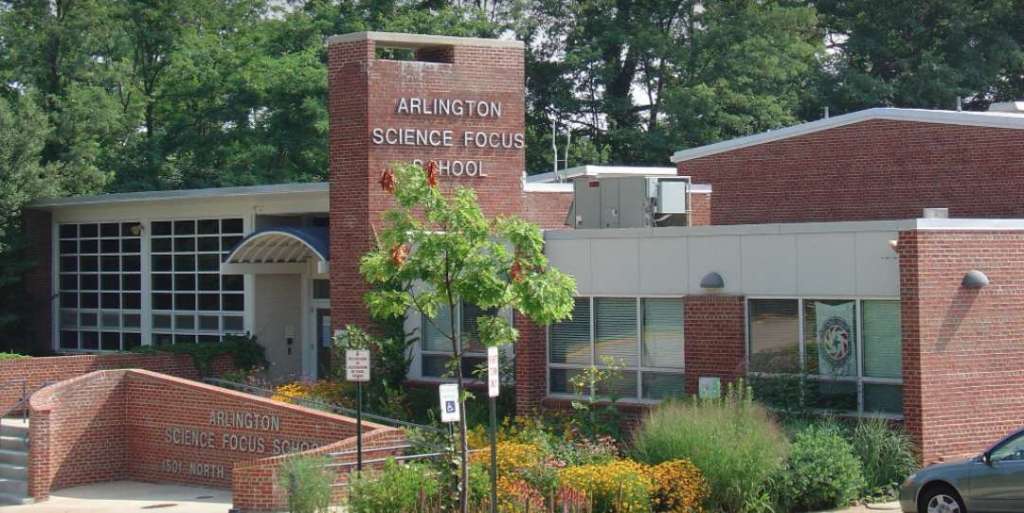(Updated at 1 p.m.) The Arlington Science Focus School and Key Immersion School will swap buildings sometime in the next few years — school officials just need to hammer out the details on when.
After the School Board decided last year to convert Key into a countywide option school, meaning it would no longer have set neighborhood attendance boundaries, the school system was faced with an unusual dilemma.
Parents in the area could once choose between Key and Arlington Science Focus, should they not want to send their students to the school’s Spanish immersion program. But after making the change, neighborhoods throughout Northeast Arlington were directed into only ASFS by default. That meant that many students newly mandated to attend ASFS actually lived closer to the Key Immersion School at 2300 Key Blvd, as ASFS now sat outside its own attendance boundaries.
With a new round of boundary changes approaching to prepare for the opening of Alice West Fleet Elementary School next year, Arlington Public School planners are taking another look at ASFS’ status to ease some of that confusion. Instead of adjusting its attendances lines this year, however, Superintendent Patrick Murphy is planning a building swap between Key and ASFS, to take place in either 2020 or 2021.
“This decision is a wise decision because we’re a growing school division, we’re adding capacity, and we really have come to this point,” Murphy told the Board at an Aug. 28 meeting.
He added that he doesn’t see any need for the Board to formally sign off on the plan, which would move the Key program to the ASFS building at 1501 N. Lincoln Street and vice versa, but the Board will get to help APS decide when the move happens.
That prompted a bit of unease among Board members. While no one openly opposed Murphy’s plan, some members did express some reservations about how exactly the process might work.
“I know some people will be excited about the prospect, because for some it means they can walk to school more easily,” said Board member Monique O’Grady. “For others, the walkability is tougher… and when there’s uncertainty about the future, it creates a lot of angst and people will feel unsettled.”
For instance, Board Chair Reid Goldstein pointed out that both schools are currently over capacity — as of 2017, ASFS had 128 more students enrolled than it was designed to hold, while Key is 86 students over its designed capacity. ASFS and Key required six and four trailers last year, respectively, and the division is projecting that both buildings will be even more overcrowded this year.
“It’s a tough nut to crack,” Goldstein said. “That’s going to create problems if and when boundaries are drawn.”
Additionally, Key’s building is designed to hold about 100 more students than ASFS, and 58 more students attended Key than ASFS last year, another area of concern for Board members.
“If the Arlington Science Focus building is smaller and the immersion program is bigger, we’re not going to be able to grow immersion program,” said Vice Chair Tannia Talento. “So we need to think about: what’re our goals for the long term with the immersion program?”
But APS officials argue that the current ASFS site has room for additional trailers to accommodate the larger number of students coming over from Key. The school system also hopes to control enrollment there moving forward, because the immersion program is based on student applications, rather than neighborhood populations.
Lisa Stengle, APS director of planning and evaluation, added that the new Reed school will add additional capacity when it opens in Westover in 2021 and ease some of the strain. She also noted that the school system’s initial plans suggest that “students and staff at both schools could largely remain intact,” though that will depend on when APS executes the swap.
If the school system switches the buildings in time for fall 2020, Stengle points out that ASFS would see its boundaries adjusted immediately afterward, as staffers draw attendance lines to cope with the opening of the Reed school. But if APS waits until 2021, she said officials “might not be able to move everybody together,” scrambling each school’s enrollment a bit more.
By January, the school system plans to publish a “community engagement timeline” to collect feedback on when, exactly, to make the swap.
In the meantime, the Board is set to approve new boundaries for eight other elementary schools later this winter.



